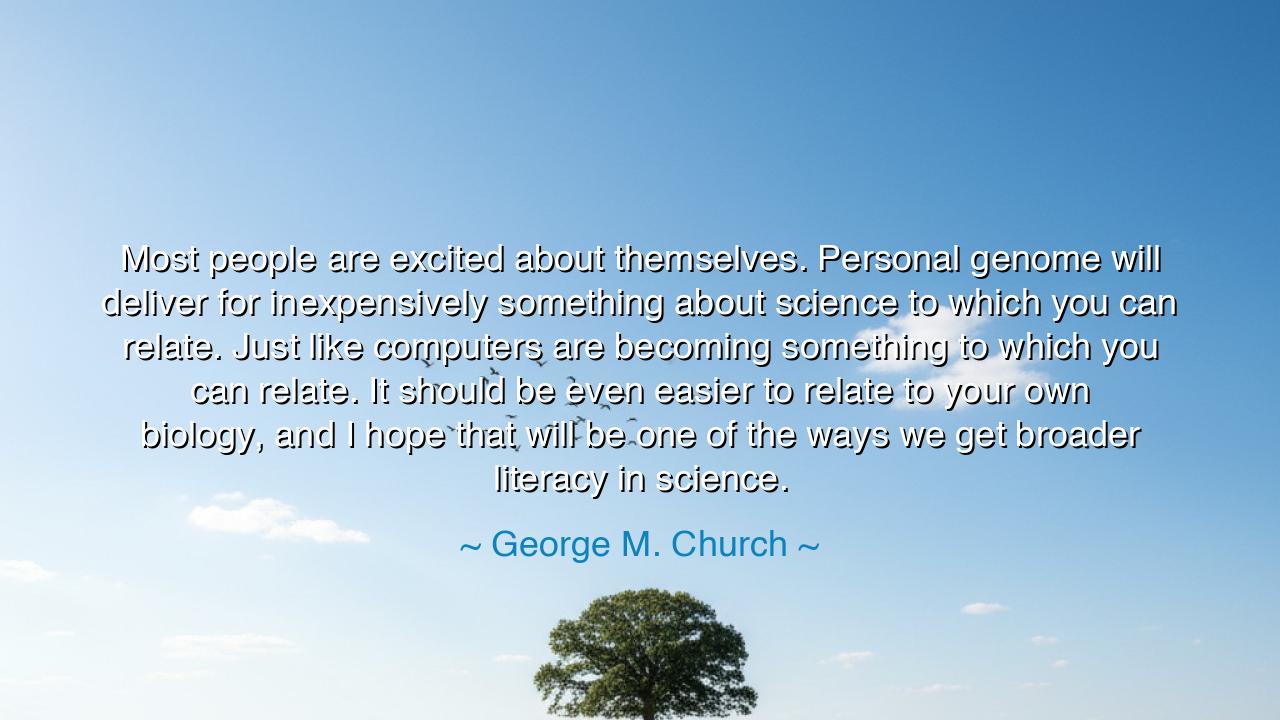
Most people are excited about themselves. Personal genome will
Most people are excited about themselves. Personal genome will deliver for inexpensively something about science to which you can relate. Just like computers are becoming something to which you can relate. It should be even easier to relate to your own biology, and I hope that will be one of the ways we get broader literacy in science.






The visionary geneticist George M. Church, one of the great minds who helped shape the field of genomics, once declared: “Most people are excited about themselves. Personal genome will deliver for inexpensively something about science to which you can relate. Just like computers are becoming something to which you can relate. It should be even easier to relate to your own biology, and I hope that will be one of the ways we get broader literacy in science.” Beneath these words lies a revelation about both knowledge and human nature—a bridge between the self and the cosmos, between the mysteries of biology and the yearning of the spirit to understand its own origins. In his statement, Church reminds us that science is not distant or cold; it is the mirror of our own being.
In ancient times, the sages and philosophers sought to understand the world by first understanding themselves. The inscription carved upon the Temple of Apollo at Delphi read: “Know thyself.” For to know one’s own essence was to touch the essence of all things. George Church’s words echo this timeless command, but with the language of the modern age. Where once the philosophers pondered the soul, the modern scientist now studies the genome—the written code of life, a scripture etched not on stone but within flesh. Church envisions a world where every person can look inward, into their own DNA, and see not a mystery but a story—a story of ancestry, potential, and shared humanity.
When he says that “most people are excited about themselves,” he speaks not of vanity, but of connection. It is the natural desire of humankind to seek meaning in its own reflection. We are drawn to whatever reveals more about who we are. And so, personal genomics—the study of one’s individual genetic makeup—becomes a sacred gateway to understanding the greater fabric of life. Just as computers once transformed how we interacted with knowledge, making it immediate and personal, so too shall biology become a language every person can speak. In this, Church foresees a revolution—not of technology alone, but of literacy, of wisdom made intimate and accessible to all.
In history, there have always been moments when a new way of knowing reshaped civilization. When Galileo lifted his telescope toward the heavens, he did not merely discover moons and stars; he shifted humanity’s place in the universe. When the printing press spread words to every home, knowledge ceased to belong only to the few. So too, says Church, will the personal genome democratize the mysteries of life itself. The book of creation will be opened to every man and woman, written not in Latin or code, but in the living letters of their own body. What once belonged to scientists and scholars will now belong to all who seek understanding.
But this vision carries with it both wonder and warning. For knowledge, if untempered by wisdom, can divide as easily as it unites. The ancients spoke of Prometheus, who stole fire from the gods to give to man. That fire illuminated the world—but it also burned. Likewise, to look into our biology is to awaken both power and responsibility. We may discover our strengths, but also our vulnerabilities; our uniqueness, but also our shared fragility. Church’s hope is that by revealing how deeply we are connected through our genes, humanity will learn empathy—that through science, we might rediscover our oneness.
Consider the story of the Human Genome Project, which once seemed as impossible as mapping the stars. For decades, scientists labored to decode the vast script of life, believing it would take a century. But through cooperation and courage, it was completed in little more than a decade. And what did it reveal? That all humans, regardless of race or nation, share more than 99% of their genetic code. It was a truth the poets had always known—that we are one family, one species, one shared breath of creation. Church’s vision of personal genomics carries forward that revelation, inviting each person to read their own verse in the poem of life.
The lesson, then, is clear: to know your biology is to know your belonging. Do not fear the science that reveals what you are made of; embrace it as the next step in the ancient journey toward self-understanding. But remember, knowledge must serve compassion. Use the tools of science not to separate, but to unite; not to claim superiority, but to foster empathy and health. Let curiosity become reverence, and let discovery deepen humility. For the same code that defines you sings also within your neighbor, your ancestors, and all living things.
Thus, George M. Church’s words are not merely about science—they are a call to awakening. The more we learn about ourselves, the more we must cherish one another. The personal genome is not just a map of who you are; it is a mirror reflecting the entire human story. And as we gaze into that mirror, let us not see only the face of the self, but the great tapestry of life to which we belong. For in the end, the greatest literacy is not of books or code, but of the living world itself—and in learning to read it, we learn to live with wisdom, gratitude, and awe.






AAdministratorAdministrator
Welcome, honored guests. Please leave a comment, we will respond soon